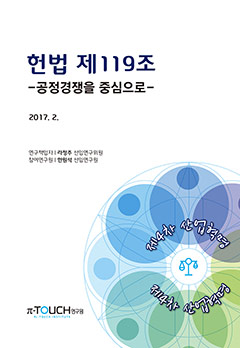 |
Title | Article 119 of the Constitution - Focused on Fair Competition |
|---|---|---|
| Writer | La, Jung Joo & Han, Won Suk | |
| Date | 2017.03.23 | |
| Outline | The purpose of this study is to systematically analyze how Article 119 of the Constitution is related to the concept of fair competition, and based on the result of the analysis, to present directions in which the Korean economy should move toward. |
![]() Article 119 of the Constitution - Focused on Fair Competition.pdf
Article 119 of the Constitution - Focused on Fair Competition.pdf
The purpose of this study is to systematically analyze how Article 119 of the Constitution is related to the concept of fair competition, and based on the result of the analysis, to present direction in which the Korean economy should move toward.
The actual conditions of the Korean economy in light of Article 119 of the Constitution are as follows. First, as an institutional environment for innovative entrepreneurship activities, the level of market power weakening of large corporations is very low, placing a 120th place out of 144 countries for the period 2014~2015. Second, if the average monthly wage of the prime contractor is set at '100’, the average monthly wages for the first, second, and third-tier subcontractors are 52, 50 and 42, respectively, which are only half of the prime contractor’s wage. Third, the portion of the credit purchase of the department stores is very high at 73% whereas the portion of the direct purchase is very low at only 4%. Fourth, the effectiveness of Korea’s Fair Trade Act is 47th among 144 countries, which is even lower than Malaysia (17th) and Rwanda (28th).
Article 119 Paragraph 1 of the Constitution means that the economic freedom and the economic justice of the economic democracy are combined for competition, and Paragraph 2 means that the economic equality and the economic justice of the economic democracy are combined for fairness.Therefore, Article 119 of the Constitution orders 'Fair Competition’.
From the standpoint of fair competition, the major solutions for implementing Article 119 of the Constitution are as follows. First, to regulate large corporations, various measures must be taken including enactment of special law, dissolution of the existing circular equity investment, non-application of system that excludes dividends received from profit, upward adjustment of the minimum shareholding requirement for a holding company (first-tier subsidiary) to possess on a subsidiary company (second-tier subsidiary), and strengthening of post-regulations to impose stringent responsibilities (multiple case lawsuits, class action lawsuits, punitive damages system, etc.). Second, the general rule is that transactions between the affiliates of large corporations are open bidding but only when high transaction cost is expected due to the undeveloped market, a negotiated contract can be completed only after preparing and submitting a letter of explanation to the related government agencies. Third, the portion of direct purchase transactions of department stores should be increased to at least 30%. Fourth, the system that gives the Fair Trade Commission 'an exclusive right to accuse’ should be abolished.
| NO. | Title | Writer | Date | |
|---|---|---|---|---|
| 4 | Impact of the Fourth Industrial Revolution on Jobs - Focusing on A New Analysis Model Kim, Kang Hyun & La, Jung Joo / 2017.10.10 |
|||
| 3 | Directions for Regulatory Reforms in the Era of the Fourth Industrial Revolution Shim, Young Seop / 2017.10.10 |
|||
| 2 | The Effects of Inter-company Transactions of Large Corporations on National Economy La, Jung Joo / 2017.07.10 |
|||
| # | Article 119 of the Constitution - Focused on Fair Competition La, Jung Joo & Han, Won Suk / 2017.03.23 |